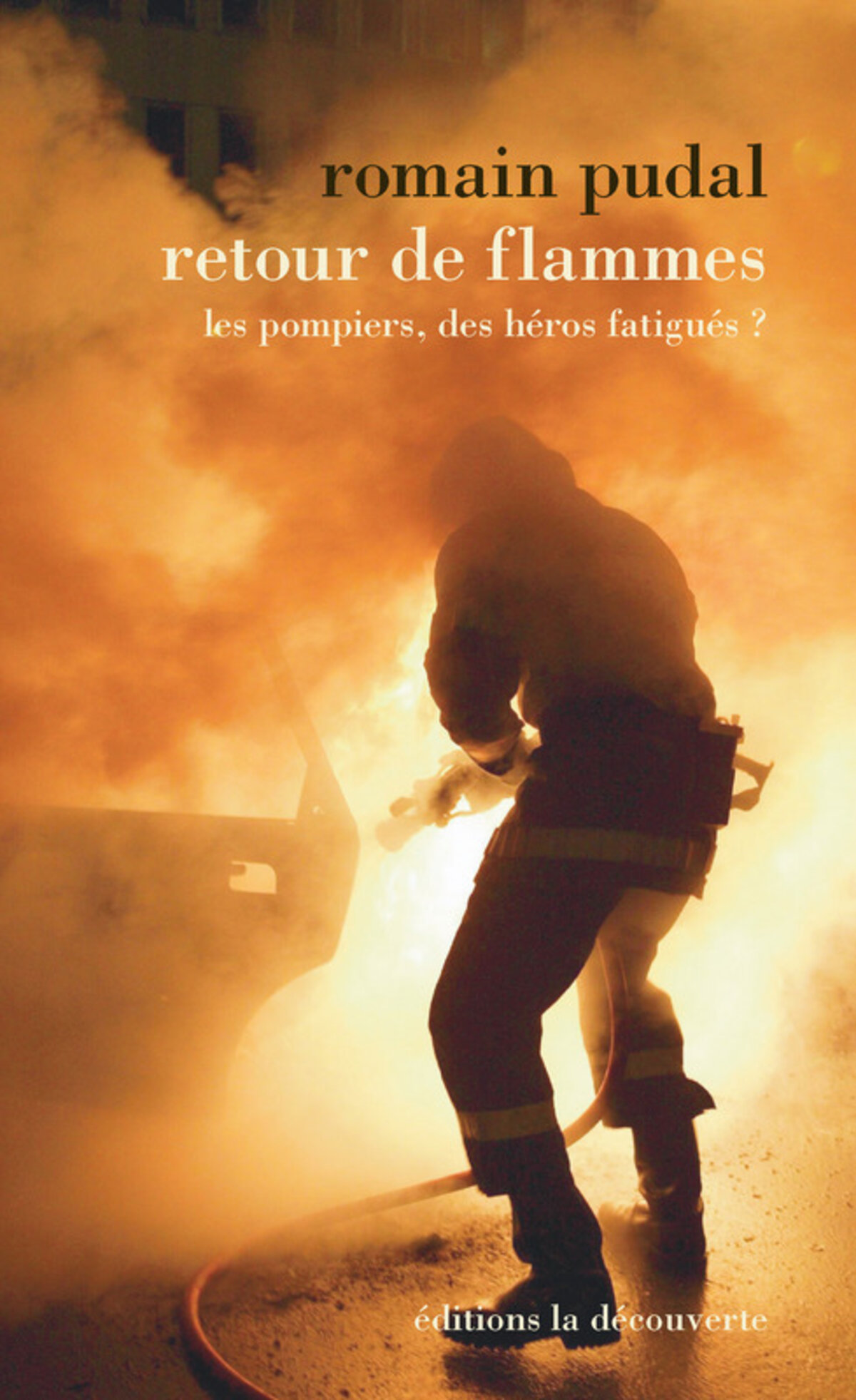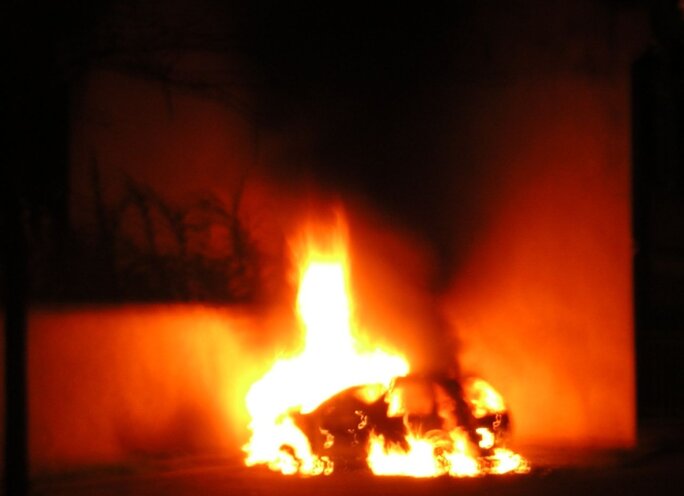Sociologist Romain Pudal did his military service as a firefighter, and subsequently joined the brigade, in 2002, as a volunteer, which is the status of the majority of firefighters, or pompiers, in France.
Importantly, French firefighters have both a firefighting and paramedic role, which results in them attending to victims of car crashes but also those of domestic incidents. They are exposed to flames and flooding accidents, but also to scenes of social misery.

Enlargement : Illustration 1

There were two main reasons for Pudal, who is based in the outer Paris suburbs, to embark on the project of his book, Retour de flammes. Les pompiers, des héros fatigués ? (‘Flashback: firefighters – tired heros?’). One was what he describes as “the pretty broad ignorance about this universe which at first glance is familiar, everyone thinks they know firefighters because they are part of the scenery and almost a thing of folklore”. The other was because the red truck, the giant ladder and duty shifts at the fire station are pertinent posts of observation about society and its evolution.
Pudal says it is now “frequent to call up firefighters to manage difficult, complicated, painful situations which translate the ills of a society in which people live ever more badly – whether it be unemployment, precariousness, every form of insecurity, and hopelessness also”.
He begins the book with a description of the world of France’s 245,000 active firefighters, of which 16% are professionals, 78% are volunteers, and 5% are military personnel. It is a world far less homogenous and far more complex than often perceived. Pudal presents the strict discipline of the firefighters, the spirit of a corps, which is marked by schoolboy humour and self-deprecation, a “real valorisation” of mutual aid, the importance of the motto “altruism, efficiency, discretion”, and what he describes as “a sort of counter-society that is critical of the ostentatious and individual success that is paraded as an ultimate value”. But there is also the negative side, that of virile initiation rituals, the recruitment of a homogeneous social and ethnic group, and a degree of racism.
“Coming from the working class and the lower middle class, firefighters work towards maintaining a social link, forms of solidarity and mutual aid in a world that gives more and more space and honour to broad competition and conflicts,” writes Pudal. “That is why I have seen, over the passing years, a sort of lower-class militancy which is mocking of grand speeches and declarations.”
Because the economic crisis has first and foremost worsened the conditions of working class populations, becoming a firefighter is “for many” a way out. Once a recruit has gained their professional diploma, there is the possibility of becoming a civil servant, and therefore to benefit from job security.
He recounts the day-to-day working life of a firefighter, a polyvalent role that goes well beyond fighting fires because there are “many other missions that deal with looking after social and psychological misery in our society: fights, assaults, depression, loneliness, anxiety, ill health at the work place, family disputes”. He says that many firefighters express distaste for certain missions, like providing first aid at “the alcohol-fuelled evenings of an elite business school in our sector”, but also, at the other end of the social spectrum, dealing with what they call the “soc” cases, referring to those who rely on social assistance benefits, who they also call “the assisted”.
Pudal describes a service that operates “under tension” and which is “the only public service in France whose existence principally depends upon the engagement of citizens [volunteers] who don’t have professional status”. There is, he argues, a trend over recent years whereby the category of professionals among the firefighting force is being made insecure, while the category of insecure (the volunteers) are being “professionalized”. The firefighting service is losing its collective character to the benefit of “phenomena of individualization”, and an obstruction of trades union activity.
He argues that there is an ambiguous redefinition of the status of volunteers, whereby the importance of the notion of citizen “engagement” is underlined all the more because it would be impossible to finance such activity with other means. “In other words, it’s a whole public service policy that is doubly at stake here,” he writes. “On the side of the public, the massive recourse to firefighters is considered as a given right, and it would not be understood that one day it becomes necessary to wait a long time for help because fire stations have closed, or to have to pay for the service. On the side of the firefighters, it is a question of offering or guaranteeing working conditions that are on the same level as the sacrifices that are demanded.”
'Long-term ethnography has changed my thinking'
Pudal draws two important conclusions from his observations. The first concerns what he calls “the phenomena of fragilisation and growing fragmentation of the working classes”, of which the fire brigade is emblematic. Most of Pudal’s firefighter colleagues have experienced social insecurity and unemployment. They cannot attain a materially comfortable existence without taking out loans, they live to a tight budget for most things, and they worry for the future of their children, and some do night shifts to earn extra to pay for private schooling. Almost all of them, writes Pudal, are “in a logic of distancing [themselves from] the ‘lowest’ fractions of the working class, and an essential part of their social being holds on to this desire for social ascension founded upon labour and merit, two cardinal values in this milieu”.
Numerous colleagues of his feel they have been given a rank of sub-social worker, and talk of their frustrations of being “society’s waste collection workers”. They finish by adopting a vision of the world where the “assisted” who depend upon social benefits are stigmatized.
Pudal worked as a firefighter during the November 2005 nationwide riots in France’s urban suburbs. The riots were triggered by the deaths by electrocution of two teenagers in a Paris suburb (see more here and here) after they were chased by police into an electricity substation. The boys, Bouna Traoré, 15, and Zyed Benna, 17, were from families of West African and North African origins. The riots that ensued were mostly animated by youths of similar ethnic origins, whose families make up large swathes of the populations of the vast housing estates which constitute many suburbs of French cities and towns. These are often little other than rundown, low-income ghettos where youth unemployment runs well above the national average.

Enlargement : Illustration 2

Pudal was also involved as a firefighter during the November 2007 riots in the northern Paris suburb of Villiers-le Bel, and which spread to surrounding areas. These were again prompted by the deaths of two teenagers, Moushin Sehhouli, 15, and Laramy Samoura, 16, whose motorbike collided with a police patrol car. During the two days of riots that followed, there were arson attacks on shops and public buildings, and firearms were used against the police.
Pudal says the atmosphere during the 2005 and 2007 riots was “electric”, and resembled “civil war”. He argues that the riots deepened the divide between firefighters and the youths of the housing estates, the former seeing no political movement in the riots. Between the young firefighters and the young rioters, writes Pudal, “whatever reading one makes of the events, fear, anger and incomprehension became installed”.
“I continue to think (as a sociologist, a firefighter, as a citizen) that ‘programmes’ thought out with intelligence could bring firefighters and these youths closer together,” he writes. “By painting a picture with broad strokes of the brush, one could say that they might have in common forms of group solidarity, a virile, even warrior-like capital, a sense of humour, which could find a resonance.”
Pudal recalls the attraction of Nicolas Sarkozy for his firefighting colleagues after the riots of 2005 and 2007, which was followed by disenchantment with the scandals of Sarkozy’s presidency, which began in June 2007, and his attacks on public services. For Pudal, the firefighters are emblematic of the white French working classes, who are easily cast as racist, sexist, traditionalist and closed into themselves. “For my part, I have the very clear feeling that the analyses of the working classes or the lower middle classes who I have known often display a profound contempt of class. By ‘contempt of class’ I mean both a contempt for the social class, as if this social stratification was out of date – not trendy enough for some sociologists and political scientists who are seduced by ‘radical chic’ theories – and a class racism: in the eyes of these same analysts, the stabilised (but ever more fragile) white working classes, and what’s more, masculine with regard to the firefighters, have attributes that are very little attractive. Too attached to traditional values, too much in favour of order, too obviously, at first glance, racist and sexist, firefighters do not embody ‘the dominated’ they like to defend.”
Romain Pudal concludes with a stinging attack on the socialist government. He slams “measures that continue to break-up the public services – one of the rare roads to salvation for the working classes”, as he does also “the announced reform of the labour law which should further aggravate the feeling of insecurity and fragility”.
“One cannot in all tranquillity denounce the inwardness and rejection of others, when one maintains, oneself, a ferociously protected and preserved world of those of our own; one cannot give lessons in all impunity on civic and political morals when one is disengaged from all that does not offer economic or institutional profit,” writes Pudal. “[…] A political and social pact could have been tied between working class youth and the forces of the Left around public services as a cardinal common value.” He adds: “The terms ‘public service’, ‘public interest’, could still be heard in my fire station when I first put foot there.”
Pudal considers what has caused the shift to the Right of the working classes. “I would venture a sort of three-level equation,” he writes. “Living conditions that are deteriorated and made fragile, plus a mediocre political choice, plus a class contempt by a whole section of the leftist elites.
It is not very often in a scientific work that one notices to what degree the researcher’s studies have ended up changing their point of view. Asking himself how it is that certain dominated sections of society can contribute, through their politicisation and their vote, to maintaining a social order that goes against their interests, Pudal surmises: “Social order is perhaps not necessarily a problem for the dominated person, if they are not too dominated, not all the time, and if that does not correspond to a form of total alienation and dispossession. I would not have written that a few years ago, because obviously I shared the ‘cultural and political presuppositions’ inherent to my situation as a Parisian left-wing intellectual. I think that long-term ethnography has made me take this shift.”
-------------------------
- Romain Pudal's book Retour de flammes. Les pompiers, des héros fatigués ? is published in French by Editions La Découverte, priced 16.50 euros.
- The French version of this article can be found here.
English version by Graham Tearse


